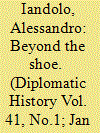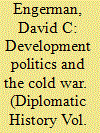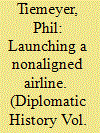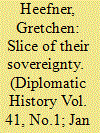|
|
|
Sort Order |
|
|
|
Items / Page
|
|
|
|
|
|
|
| Srl | Item |
| 1 |
ID:
152911


|
|
|
| 2 |
ID:
152912


|
|
|
|
|
| Summary/Abstract |
History tends to remember Soviet participation at the Fifteenth Session of the United Nations General Assembly (UN GA, September 1960–April 1961) because of Nikita Khrushchev’s shoe. On October 13, 1960, the Soviet leader allegedly banged his shoe against his desk in the General Assembly hall to protest a speech he did not like.1 The incident is among the most well known in the history of the Cold War. However, despite the interest it has generated, Khrushchev’s conduct was the least important aspect of Soviet relations with the UN in 1960–61. This article reassesses Soviet participation at the Fifteenth Session of the GA in light of its medium- and long-term consequences for UN structure, practices, and vision. It also brings the issue of Moscow’s relations with UN members from the Third World, until now overlooked in the existing literature, into the story of this UN session.
|
|
|
|
|
|
|
|
|
|
|
|
|
|
|
|
| 3 |
ID:
152907


|
|
|
|
|
| Summary/Abstract |
Development Politics and the Cold War’ analyzes history of development assistance during the Cold War, focusing especially on superpower aid to India for the three decades after independence in 1947. It examines development as a rhetorical strategy that allowed groups in both donor and recipient nations to make claims upon others. It also calls for moving beyond “development talk” to examine the practice of development. And finally it shows how development assistance – undertaken in the name of building economic self-sufficiency, ultimately undercut the governability of recipient nations.
|
|
|
|
|
|
|
|
|
|
|
|
|
|
|
|
| 4 |
ID:
152910


|
|
|
|
|
| Summary/Abstract |
This article examines the civil aviation sector to demonstrate Yugoslavia's growing economic ties to the Global South thanks to nonalignment. It also considers U.S. reactions to Yugoslavia's growth as an aviation hub, in an effort to reassess the “wedge” strategy that dominated U.S. policy toward Yugoslavia during the Cold War.
|
|
|
|
|
|
|
|
|
|
|
|
|
|
|
|
| 5 |
ID:
152908


|
|
|
|
|
| Summary/Abstract |
After 1660, writes historian Michael LaCombe, Englishmen depicted Native Americans as “tragic, hungry, and helpless victims.”1 A century later, Anglo-Irishman William Johnson, Superintendent of Indian Affairs, did otherwise. In describing the increased expense of Indian alliances in 1765 he complained, “All the Bull feasts ever given at Albany would not now draw down Ten Indians.”2 LaCombe’s English writers portrayed powerless, starving Indians, while Johnson worried about powerful ones uninterested in feasting. Historians must reconcile these contrasting portrayals. This article examines several ideas about Native hunger—that of the starving and useless mouth, that of the supplicant using hunger as a metaphor, and that of the warrior capable of doing without European provisions—which emerged over more than a century of Native and non-Native diplomacy. It contends that British misunderstandings of Iroquois (otherwise known as Six Nations, or Haudenosaunee) hunger during the American Revolution enabled Indians to use food diplomacy to retain power during a period that historians have characterized as disastrous for Natives.3 Indians accepted provisions and then refused to do what their allies wished, they explicitly ignored their hunger, and most significantly, they destroyed their allies’ food.
|
|
|
|
|
|
|
|
|
|
|
|
|
|
|
|
| 6 |
ID:
152913


|
|
|
|
|
| Summary/Abstract |
Thomas Jefferson’s decision to use federal government funds to cover the expenses of the Tunisian Ambassador during his nearly year-long visit created a political firestorm. Federalist and Democratic-Republican newspaper editors and politicians deemed the diplomat a racially inferior barbarian, while the public (and some elites) treated him like a celebrity.
|
|
|
|
|
|
|
|
|
|
|
|
|
|
|
|
| 7 |
ID:
152909


|
|
|
|
|
| Summary/Abstract |
Using the case study of Libya, this article examines how U.S. policymakers sought to rationalize their appropriation of sovereign territory for strategic needs in the 1940s. This article also demonstrates how scholars can use the often-overlooked infrastructure of the U.S. military to historicize the bottom-up construction of U.S. global power.
|
|
|
|
|
|
|
|
|
|
|
|
|
|
|
|
| 8 |
ID:
152914


|
|
|
|
|
| Summary/Abstract |
In April 2003, against the backdrop of a severe deterioration of bilateral relations resulting from France’s determined opposition to the recent American (and British) invasion of Iraq and from the George W. Bush administration’s willingness to “punish” Paris for it, French President Jacques Chirac asked his diplomatic adviser to call his White House opposite number, National Security Adviser Condoleezza Rice, to find out if the page of Franco-American discord could be turned. Chirac wanted to show good will: France was ready to cooperate with the United States to shape the future of Iraq, his message went. But Rice’s response was icy: “We have paid our victory with our blood and treasure,” she said, adding, “we don’t need you.”
|
|
|
|
|
|
|
|
|
|
|
|
|
|
|
|
|
|
|
|
|